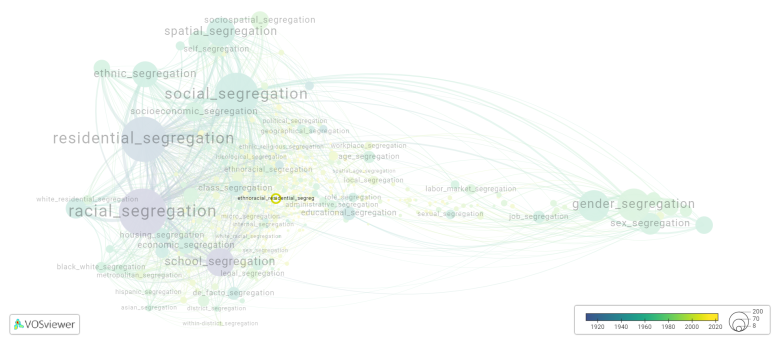Ethnoracial residential segregation: Difference between revisions
(Creating page) |
(Creating page) |
||
| Line 20: | Line 20: | ||
[[File:ethnoracial_residential_segregation.png|780x780px]] | [[File:ethnoracial_residential_segregation.png|780x780px]] | ||
Visualization based on the [[How_to_cite_Segregation_Wiki| research]] | |||
For the complete network of associated segregation forms, see: | For the complete network of associated segregation forms, see: | ||
year of publication https://tinyurl.com/2235lkhw | * First year of publication https://tinyurl.com/2235lkhw | ||
Louvain clusters https://tinyurl.com/2d8wg5n3 | * Louvain clusters https://tinyurl.com/2d8wg5n3 | ||
* Betweenness centrality https://tinyurl.com/223udk5r | |||
* Disciplines where segregation forms first appeared https://tinyurl.com/244d8unz | |||
==References== | ==References== | ||
==Notes== | ==Notes== | ||
Revision as of 13:40, 3 October 2024
Date and country of first publication[1]
2016
United States
Definition
Ethnoracial residential segregation refers to the spatial separation of different racial and ethnic groups within a particular city or region. This form of segregation occurs when different groups of people, usually defined by race or ethnicity, tend to cluster or concentrate in specific neighborhoods or areas.
Ethnoracial residential segregation can result from a variety of factors, including historical patterns of housing discrimination, socioeconomic disparities, institutionalized racism, and personal preferences. These factors can lead to unequal access to resources and opportunities, perpetuating social and economic inequalities among different racial and ethnic groups.
The consequences of ethnoracial residential segregation can be far-reaching. Concentrated poverty, limited access to quality education, inadequate healthcare facilities, and reduced opportunities for social mobility are some of the challenges faced by individuals living in segregated neighborhoods. Additionally, segregation can contribute to social tension, perpetuation of stereotypes, and the erosion of social cohesion.
Efforts to combat ethnoracial residential segregation include fair housing policies, anti-discrimination laws, and community development initiatives aimed at promoting diversity and inclusive neighborhoods. Enhancing access to affordable housing, improving educational opportunities, and promoting economic development are also important strategies to address this issue.
It is important to note that ethnoracial residential segregation varies across different countries and regions, depending on the specific historical, social, and political context.
See also
Related segregation forms
Ethnoracial residential segregation is frequently discussed in the literature with the following segregation forms:
racial residential segregation

Visualization based on the research
For the complete network of associated segregation forms, see:
- First year of publication https://tinyurl.com/2235lkhw
- Louvain clusters https://tinyurl.com/2d8wg5n3
- Betweenness centrality https://tinyurl.com/223udk5r
- Disciplines where segregation forms first appeared https://tinyurl.com/244d8unz
References
Notes
- ↑ Date and country of first publication as informed by the Scopus database (December 2023).
At its current state, this definition has been generated by a Large Language Model (LLM) so far without review by an independent researcher or a member of the curating team of segregation experts that keep the Segregation Wiki online. While we strive for accuracy, we cannot guarantee its reliability, completeness and timeliness. Please use this content with caution and verify information as needed. Also, feel free to improve on the definition as you see fit, including the use of references and other informational resources. We value your input in enhancing the quality and accuracy of the definitions of segregation forms collectively offered in the Segregation Wiki ©.
Ethnoracial residential segregation appears in the following literature
Sewell A.A. (2016). The Racism Race Reification Process: A Mesolevel Political Economic Framework for Understanding Racial Health Disparities. Sociology of Race and Ethnicity, 2(4), 402-432. SAGE Publications Inc..https://doi.org/10.1177/2332649215626936
